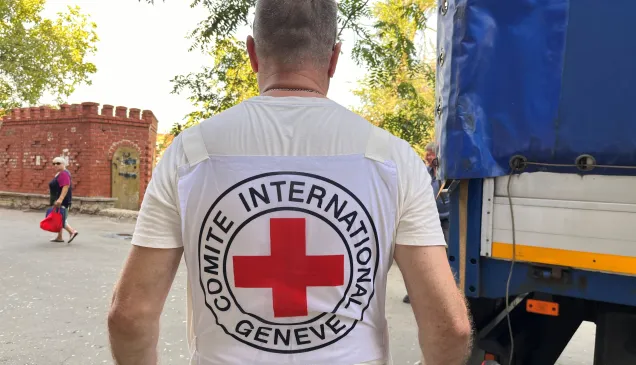Multinational forces
Over the years, the spectrum of multinational forces operations – most of the time under UN mandate for peace-enforcement or peacekeeping purposes – has become increasingly broad. The multifaceted nature of these operations, the emerging concept of integrated missions and the ever more difficult and violent environments in which these forces operate have highlighted how important it is to identify the legal framework applicable to these situations.
For forces engaged in peace-operations, the dangerous and volatile contexts in which they operate makes it more likely that they will become involved in the use of force. In such an environment, the question of the applicability of IHL becomes acute.
Applicability of IHL
It has always been the ICRC's view that multinational forces must observe IHL when conditions for its applicability are met. The nature of the situation in which multinational forces evolve and the correlative assessment of IHL applicability must be determined solely on the basis of the facts on the ground, irrespective of the formal mandate assigned to the peace operations by the Security Council and irrespective of the label given to the parties potentially opposed to peace forces. The mandate and the legitimacy of the mission entrusted to the peace forces are issues of jus ad bellum and have no bearing on the applicability of IHL to those operations.
Occupation law
Occupation law also apply to multinational operations, in particular to those operations conducted under United Nations auspices. While such applicability may appear to be a kind of taboo for the international organizations involved as well as for some troops contributing States, occupation law must not discarded outright and the rights, obligations and protections derived from it must be applied when the conditions for their applicability are met. This body of law, which has proved useful in the past, would provide some practical guidance, in particular for situations in which the multinational forces are using extensive administrative and/or legislative powers or may have to perform tasks normally carried out by national authorities.
Detention activities
Multinational operations today are characterized by the recurrent involvement of the armed forces in the detention of individuals. One of the main challenges faced by multinational forces dealing with detention is to ensure that they meet their international obligations – stemming in particular from IHL and human rights law – when handling detainees. These obligations include rules applying to the transfer of detainees to local authorities or to other troops contributing States. One of the main challenges is how to develop common standards that will adequately reflect the detailed legal obligations set forth in IHL and human rights law. These include, in particular, an important set of procedural safeguards for administrative detention as well as the principle of non refoulement, which prohibits a State from transferring a person to another State if there are substantial grounds for believing that he or she runs a risk of being subjected to violations of his or her fundamental rights, notably torture, other forms of ill-treatment, persecution or arbitrary deprivation of life.
Dissemination of IHL
Since multinational forces have often been involved in hostilities and law-enforcement operations, the ICRC considers it extremely important that those forces be fully acquainted with and adhere scrupulously to the rules of IHL and other relevant bodies of law such as human rights law. The ICRC remains convinced that sound training in international humanitarian law has a preventive value and offers significant operational benefits for peace operations.
Protection of peacekeepers
Armed conflicts have taken a heavy toll among the personnel of peace operations. As evidenced by the corresponding war crime under the 1998 Rome Statute of the International Criminal Court, IHL contains a clear prohibition of attacks against personnel and objects involved in a peacekeeping mission in accordance with the Charter of the United Nations, as long as they are entitled to the protection given to civilians and civilian objects under IHL. This prohibition is considered to be customary law and thus binding on all parties to armed conflict. Therefore, it cannot be said that the protection for peace-operation personnel in armed conflicts suffers from a legal vacuum within IHL.
Neutral independent humanitarian action approach
Finally, it is important to underline the necessity of preserving the essence of neutral and independent humanitarian action. Over the years, the ICRC has devoted considerable attention to the issue of the relationship between humanitarian activities, on the one hand, and political or military action, on the other. The ICRC strongly believes that the two must be kept separate and distinct inasmuch as their conflation could result in confusion detrimental to humanitarian work and to the safety of the humanitarian personnel. For this very reason, the ICRC deems it essential that political or military operations, including those carried out under UN auspices, be conceived in such a way as not to erode the neutrality and impartiality of humanitarian operations.



